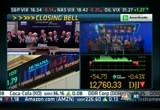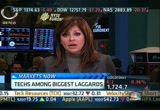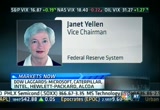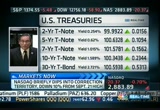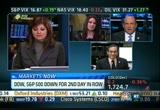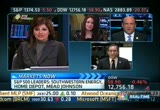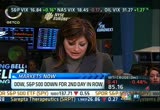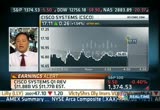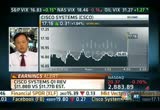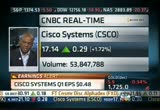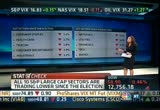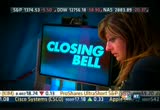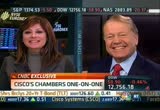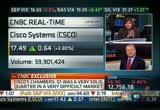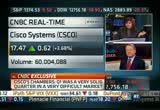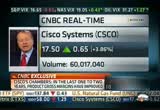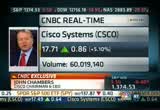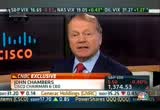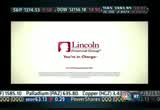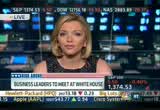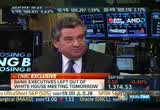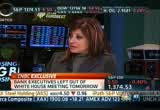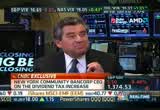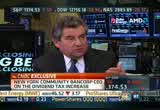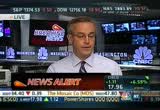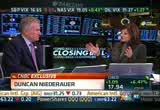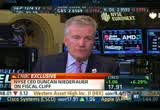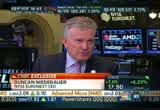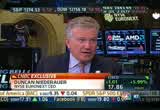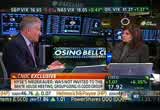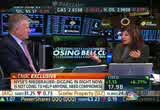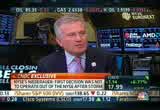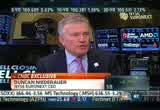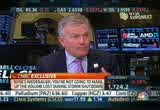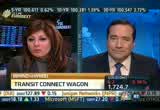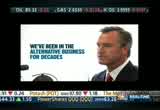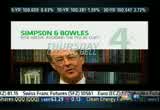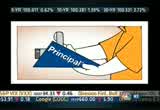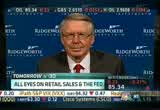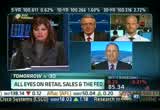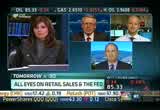tv Closing Bell With Maria Bartiromo CNBC November 13, 2012 4:00pm-5:00pm EST
4:00 pm
down 60 on the open today. down almost 60 right now. what will set the tone for tomorrow? how about cisco's earnings? you'll hear those in a moment exclusively from john chambers. see you tomorrow. it is 4:00 on wall street. do you know where your money? hi, everybody. welcome back to the "closing bell." i'm maria bartiromo at the new york stock exchange. the post-election hangover continues on wall street. here's a look at how we're settling out today. we're ending near the lows, in fact, at the lows. down 60 points on the dow industrial average. nasdaq composite, weaker by 20 points. technology one of the laggards here today at 2883. the s&p 500 tonight gave up five points at 1374. we are moments away from quarterly earn from cisco. the company is expected to report a profit for the first quarter of 46 cents a share and revenue of $11.77 billion.
4:01 pm
let's get to today's market action as we await the numbers. good to see everybody. thanks for joining us. carol, what are you expecting in 2013 under president obama's policies? >> i'm not expecting anything very good, maria. i think that we're going to end up with some sort of a slow down. i think whatever the compromise that ends up being made under this grand bargain, it's going to be something that ends up hurting unemployment. that being said, i think there's always a tale of two markets. from a broader market standpoint, i expect the market to be hurting. there's always opportunities to be had. >> steve, you have some breaking news earlier. you reported on janet yellen. tell us what that says about where we're headed in terms of economic growth in 2013. >> well, i think it tells us the fed is going to remain as loose as it possibly can through '13, '14, '15, and now even '16. janet yellen saying an optimal policy path, one that stays as
4:02 pm
close to 2% on inflation and tries to get the unemployment rate down to 6% could mean the fed remains easy through early 2016. by the way, they're thinking of scrapping all of that calendar date guidance through mid-2015. scrap it. she's strongly supportive in scrapping it in exchange for economic targets. the strongest signal yet we're going to have changes in the fed's communication policy. >> rick santelli, what do you make of it? >> with the fed, it depresses me. they're dancing around the edges. these aren't discussions about how we can stop the low-interest rate scenario so the government doesn't borrow too much at low interest rates. we're talking about targets. what happens to targets during crisis? they throw them out the window. what happens during long-term crisis? you bring them back. you need something to talk about. i think the cisco earnings are going to be very relevant today. they're going to have the same excuse we hear from the government.
4:03 pm
a little soft in the near term. we expect long term to be better. >> rick, there's no discussion whatsoever going on at the federal reserve of ending its easy interest rate policy. that's what's been behind whatever stimulation there is in the economy. i'm a little confused as to why you would think that would happen. >> what i'm saying is you could pick any target you want. picking targets is a far cry from actually making a difference on things like unemployment. targets are easy. >> but here's the thing. >> but the target is 2015. rates aren't movmoving. what are you suggesting? the fed was clear about this. >> if the rates go up, we're in a big, big problem because we cannot service the debt. they have to keep them down. >> very good point. >> i don't think that's what's behind fed policy. >> i do. >> when you think about higher interest rates, you have to consider why interest rates would be higher. they could be higher if there was more economic growth.
4:04 pm
more economic growth would mean higher tax revenue. in that regard, you wouldn't necessarily have to have these low interest rates. you could service a higher interest rate and a higher debt service if there was more economic growth. >> how do we get economic growth? >> when the private sector decides it's going to invest and spend and hire, maria. those are the sources of economic growth. >> when they decide that $2.3 trillion that the fed is kind of been the host say, listen, park it here. that's what their programs have done. we need to reverse that. get that money working. what the fed is doing is just creating a taller mountain. >> rick, i've heard this. you want to tighten the balance sheet and raise interest rates to stick late economic growth. i don't get it. >> i want to stop the discussion about controlling rates. at this point, why should we open up this place? just have ben bernanke mail in the ten-year rate. >> in the world of a fiat currency, a federal reserve or bank has always controlled the price of money because the amount of money in the system is
4:05 pm
an artificial creation. you want to go back to the gold standard, which was fabulous in the '30s. >> no, i don't. i'd like to go back to the market-driven standard. free markets for free men. >> you know what he wants, steve. >> fundamental, not monetary policy. >> he wants a gold standard, which is neither free nor fair. >> you want a gold standard, rick? >> no. i love libertarians, but the problem with libertarians is they have good ideas but no way to actually get it done. a lot like the fed targets. >> we're very thankful of that, some of us, at least. >> oh, god. you guys, look, let's talk about the areas of this market that have been under pressure since the election. dividend payers are one of them because of all of this uncertainty. but i have to do something else first. go ahead, joe. 48 cents is the number on cisco versus 46 cents estimate.
4:06 pm
on revenue, $11.88 billion. we just got the cisco numbers, everyone. 48 cents a share is the earnings for cisco versus an estimate of 46 cents a share. the revenue coming in at $11.88 billion. that's also better than the estimate, which called for revenue of $11.77 billion. we want to get some instant reaction. mark, i know you just got the headline numbers, but what's your take? >> i think those numbers are actually not that bad considering it's been a tough environment. on the bottom line, two cents better shows that the company's actually operating a little better. the issue, really, is related to the stock, which is underperformed so far. it's down 6% last year. down 6% again this year. operationally, they are doing a better job. they also boosted their dividend. when we talk to investors, there seems to be a buyer strike at the moment. investors are concerned about networking and whether that
4:07 pm
entire market can become monetized and cisco's margins will be decreased. i think what's more important are the details of whether cisco can convince investors that the company can compete in an environment which is becoming increasingly software centric. >> now, you know that gross margins have slid over the past few years. what would signal a reversal in that trend? >> that's a good point. at its peak, gross margins were about 70%. last quarter, they were about 62%. i think more software, better products, and better engineersiengineering of a lot of these products will lift gross margin. >> so what concerns you most now for cisco? is it the environment or is it this is a cisco problem, or has business just simply slowed? >> i think it's a function of both. the macro is tough. i.t. spending doesn't look to
4:08 pm
great. for cisco, they have to convince investors they can grow, have good returns on their investments and also not be kmodtized. i think that's weighing on the stock. if you look at the multiple, the multiple has compressed every single year for the past eight or ten years. >> i want to get to john fortt. you rate cisco as sector perform. knowing what we know right now, mark, would you commit new capital to this stock? >> i think where the stock is at the moment, i think it's going to trend in line. i think if they can boost their dividend, which is around 3 t.2 that might help is a little bit. >> all right. we'll leave it there. thanks very much, mark. back to you soon with more on the cisco story. first, let's get to john fortt with more headlines. >> maria, just a couple things i wanted to point out. one is the gross margin. my quick arithmetic points to a
4:09 pm
69% gross margin. not thrilling, but not bad. also, 6% revenue growth. that's above the 5% that some had seen as a relatively low bar. not in the range where they used to be. chambers is already guiding below that. 6%, i think a lot of people are taking as a good thing. also, they repurchased 15 million shares at $16.44. that's slightly below where the stock is trading right now. that's not bad news either. >> all right, john. thank you very much. stocks still trying to recover from their post-election selloff. jackie deangelis as the details on the day. >> good afternoon. with the election and week behind us, all three of the major indices are lower. the dow losing 3.7%. the s&p lower by 3. %. the tech heavy nasdaq lower by 4.2%. sectors tell the story better than individual stocks. take a look at the ten s&p large cap sectors. they explain investor sentiment
4:10 pm
post-election. all ten are logging losses since last week. the laggards, tech, energy, and financials. on the plus side, we're seeing consumer staples, health care, and telecom. those are the ones that have lost the least. financials, not really a surprise in terms of the laggards because president obama represents more regulation. to the energy group, he represents support of alternative energy, which in turn is bad for the oil and gas companies. with regard to technology, more regular arelation and financials could mean that private equity and venture capital firms suffer a bit. thus, tech would too. the groups that lost the least, consumer tapes, health care, and telecom, health care stocks include the hospitals. those could see a bit of a benefit when obamacare comes into play. some investors hoping that with the election behind us, we're going to see some green. with the threat of the fiscal cliff, many are expecting red as we approach the end of the year. back over to you. >> all right, jack. thanks very much. don't go anywhere. a trio of exclusive interviews kicking off the next hour of the
4:11 pm
"closing bell." coming up, maria means business. cisco ceo john chambers talks exclusively about earnings and how the looming fiscal cliff is affecting his company's bottom line. then, in another exclusive, nyse chief duncan niederauer talks to maria about how he's addressing another trading glitch that affected some 200 stocks during yesterday's trading session. and america's business leaders invited to the white house to chime in on fixing the debt and solving the fiscal cliff. but not one bank ceo is on the guest list. why is that? exclusive reaction from a top banking boss coming up on the "closing bell." [ female announcer ] e-trade was founded on the simple belief
4:12 pm
that bringing you better technology helps make you a better investor. with our revolutionary e-trade 360 dashboard you see exactly where your money is and what it's doing live. our e-trade pro platform offers powerful functionality that's still so usable you'll actually use it. and our mobile apps are the ultimate in wherever whenever investing. no matter what kind of investor you are, you'll find the technology to help you become a better one at e-trade.
4:14 pm
welcome back. network giant cisco systems is out with its first quarter results tonight. let's go straight to the top. we're joined right now in a cnbc exclusive by chairman and ceo john chambers. always nice to have you on the program. welcome back. >> maria, a pleasure to be back. i was trying to figure, i think we've been doing this for almost 20 years. >> oh, god. john, please don't date me. i mean, seriously. >> you were a teenager then, maria.
4:15 pm
>> i was a puppy. i'd like to think i still am. let's talk about these results. first off, break down the numbers. how would you characterize the last quarter? >> i would characterize it as a very solid quarter in a tough market. to have 6% revenue growth in a market where many of our peers are down, negative, year over year, to have earnings growing twice as fast as revenues, record revenues, record non-gap earnings per share. we did what we said we'd do for the market. one of your colleagues and a good friend of mine, john, the gross margins were actually 62.7%. we said revenue growth four to six. we did six. earnings per share, 45 to 47. we did 48. very, very solid quarter versus both what we expected and what the market probably expected. >> but let's talk about those gross margins, john. this is really what the analysts are writing about tonight and certainly will be bringing up in your conference call. we've seen a slide in the gross margins. not necessarily recently, but over the last few years.
4:16 pm
what's been going on, and how do you reverse that trend? >> well, maria, if you watch our trend over the last year to two years, actually, our gross margins per products have been improving. so we improved dramatically. once again, this quarter, we're switching gross margins improved. routing gross margins are solid. it's more of a mix issue. in an area such as data center, where candidly we grew 61% this quarter, knocked the cover off the ball in a market growing in high single digits, they have lower gross margins than switch does. what you're seeing in terms of profit for shareholders is very good. we don't see any fundamental change in our core products in terms of the margins within the core products. >> what can you tell us about europe right now? i believe it was last quarter when we talked. you said you expected the european market to remain very challenging over the next several quarters with spending by governments a real challenge.
4:17 pm
give us an update. >> well, maria, i think it was unfortunately very accurate. we said last quarter europe, we're modeling to be tough. it was as tough as we expected. it actually was down in low dw k double-digits year over year. the other area that was challenging was the federal government here. the rest of our markets were good to okay to very good. so we like what we see on a global basis. trends are slowly starting back up. >> what are you expecting, john, in the year ahead from government? we know that austerity has been the name of the game for governments across the world here. what would be your expectations in terms of the government business in the next couple of quarters? >> well, we're reversing the question a little bit. asia-pacific, japan, and china to grow better than the rest of the world. the u.s. is starting to show good trends.
4:18 pm
in an area that capital spending might be flat or plus 2%, enterprise is starting to show some signs of coming back outside of europe. commercial marketplace, which is what i watch the most, is also doing okay. so i would assume government's going to continue to be tough, especially the u.s. federal government. public sector around the world, okay. in the u.s., not counting federal. good in asia-pacific. still challenging in europe. >> we're looking at challenges in the u.s., obviously. i want to get your take on what's going on with with taxes and what your expectations are. first off, you've got 87% of total cash held overseas. is that right? >> that is probably pretty accurate. probably in excess of $40 billion. >> what are the pans to repay trait? is it worth taking a tax hit to invest domestically, or it's too expensi expensive, so you leave that money overseas until you see a change in tax code? >> we're at a cross roads. we clearly want to put this money to use in a way that
4:19 pm
benefits our shareholders. if we begin to invest overseas, which is what our current course is, if we don't see a chance to repay treuate, we'll start buying companies overseas. we'll start hiring overseas. so there's a window here for a compromise with business. i think to get us and others to invest in this country, we're a loyal american company. we want to grow resources here. if the rates stay where they are, you're going to see most of our investment overseas. >> that's unfortunate and really extraordinary we don't have more compromise and more understanding of the implication of this from government. i mean, tim geithner has said in the past that they leave too much revenue on table if they change the tax. >> i think it's actually the reverse of that, maria. you leave jobs on the table. you leave taxes from those jobs. you leave taxes that would generate here in the u.s. on the table. every other country in the world understands that. i've just met with with the
4:20 pm
leadership up in canada. they are the easiest place in the world to do business. we're going to invest in canada and ottawa where you have complete cooperation with the providential leadership and the national leadership. the prime minister up there is doing a great job. the leaders in the providences are doing a great job. they make it easy to do business there and invest there. we need to learn from them in terms of what we need to do in terms of investing. >> amazing. >> i'm not going away from the quarter, maria. it was a very solid quarter when many of our peers really struggled. >> yeah, it was a solid quarter. what kind of guidance are you giving for the next quarter, john? >> well, i want people to listen to our conference call, but we want to be the one company that both exceeds expectations and doesn't bring down guidance. so kind of a hint on terms of what we see. it really says we're in the right spots for growth. mobility, byod, the internet of everything, video. all growth areas in terms of opportunities going forward. we think we're positioned well. >> it's amazing. mobility has really changed the
4:21 pm
game on so many levels. it has been a game changer for business. always wonderful to have you on the program. love talking to you. look forward to the next time. >> thank you, maria. >> we'll see you soon. john chambers joining us from cisco. president obama inviting business leaders to the white house tomorrow for their input on solving the fiscal cliff. but not one of them is a banking ceo. what's behind the snub? we'll hear exclusively from one top bank ceo straight ahead. then, the ceo of the new york stock exchange will join me next on how to fix the debt. back in a moment. ♪
4:22 pm
[ female announcer ] today, it's not just about who lives in the white house, it's about who lives in the yellow house, the green, and the apartment house, too. today we not only honor the oval office, but we honor the cubicle, and the home office as well. because today it's about all of us. and no matter who you are, you're the commander-in-chief of your own life. ♪
4:23 pm
to a currency market for everyone. the potential of fxcm unlocked. nyse euronext. unlocking the world's potential. the potential of yelp unlocked. nyse euronext. unlocking the world's potential. wooohooo....hahaahahaha! oh...there you go. wooohooo....hahaahahaha! i'm gonna stand up to her! no you're not. i know. you know ronny folks who save hundreds of dollars switching to geico sure are happy. how happy are they jimmy? happier than a witch in a broom factory. get happy. get geico. fifteen minutes could save you fifteen percent or more.
4:24 pm
welcome back. president obama will meet with business leaders tomorrow at the white house, but not one wall street bank ceo is on the invitationlation. kayla is here with more reaction. over to you. >> well, you remember jpmorgan ceo jamie dimon telling you days ago on this program that if you remove the fiscal cliff overhang, the economy will boom. similarly, executives at bank of america and goldman sachs said that the fiscal cliff is hurting client activity and creating big risks and uncertainty. washington already has a good ear into what wall street is thinking, that the fiscal cliff is a barrier to their business and that a solution is needed. but what the president wants to know is how business leaders across more consumer facing industries think the problem as well as a solution would impact every day americans. the list of 12 ceos said to be compiled by the white house crosses multiple industries from etna to xerox.
4:25 pm
what they want is not a one-time meeting but a dialogue over this. >> all right, kayla. thanks so much. so why is such a key group left out of the conversation? with me now in an exclusive is the president and ceo of new york community bancorp. nice to have you here. >> d did you get the invitation to the white house? >> no, the mail was a little slow due to sandy. >> serious l the banks are not invited. is this a concern that one key part of the economy is not involved in the conversation? >> i think it's fundamental. without money, you can't create jobs. the single best source of money is banking. so even though the other corporations that are there need to spend money, they need to get money from the very places such as the new york stock exchange, such as the banks that are not being invited to this meeting. so without the banks, i think we misan important ingredient as to what needs to be done so as to
4:26 pm
create more viability in the period ahead. >> we all want to rise above it and get on board and get the economy back on track. i just worry that it's going to be two sides digging in again and lotsds of divisiveness and finger pointing. are we going to get back on track and get over this, you know, us versus them mentality? >> i think for the next four years the battle will continue. >> you do? >> however, i believe we'll settle the cliff issue just close enough to the actual date so that it'll do less damage. uncertainly is the nemesis of recovery. without them working together and making certain some of the things that need to be done are going to be done, we're going to stagger. we're gloing to potentially go into a worse place than we are today. it's really important that they demonstrate that they can work together. >> so let me get your take on the fiscal cliff. what i love about your story is new york community bancorp has a
4:27 pm
7.8% dividend. very nice dividend. does that change if dividend taxes go higher? does this fiscal cliff issue dictate your behavior in terms of paying dividends, increasing dividends, choosing a buyback over a dividend? >> the environment will dictate what, in fact, we'll do. each and every quarter we have to decide our dividend. we are very committed to the strong dividend we pay. not necessarily the yield that we pay, but to the strong dividend that we pay. so we've been over the course of many years now paying this very strong dividend despite the fact that it is a very large ratio. we have the ability to do that because we do not go to capital. in the four-plus decades we've been principally doing the business we do today, which is lending on new york real estate, we have not had any period, not a single quarter, in which we've had to go to capital as a result of losses that we took on loans. so our principle asset is multifamily loans, and we've not had to go to capital. we do it through earnings.
4:28 pm
we've had minimal losses over a long period of time. the very need for the building of capital is thwarted by the difference in our business model. >> it sounds like this fiscal cliff issue won't impact you paying this dividend. >> well, i cannot say what the rules will be. so there's no question that down the road it's entirely possible the rules will change. as the rules are crafted today, we're meeting all the reasonable expectations to be able to continue to pay our dividend. >> how is lending going? >> i think the last time we were on the show together we talked about our business model and our lending. i indicated that quarter by quarter we'd be increasing our lending. in ak shallty, we have. we see a very robust period for the niche we're in. we're a multifamily lender in the new york market principally, and we're gaining share of a market that has that viability so as to continue to give us the
4:29 pm
ability to grow the bank. so we're going to grow the bank in the period ahead. we're growing our earnings from the standpoint of prepayment penalties. we had near zero. we're going to have a -- we had a record year in '11. we'll have a record year in '12. we'll probably have a record year in '13 as well with regard to prepayment penalties. that's well over $100 million. >> in terms of pure lending, in terms of the real estate business today, how would you characterize it? >> i'd say the business in the new york market is very robust, very strong. real estate, whether it be commercial real estate or it be multifamily real estate, is very strong. >> joe, good to have you on the program. >> glad to be here. >> thank you so much. we are going to take a short break and my exclusive interview with nyse ceo duncan niederauer is next. we'll talk about the fiscal cliff and more when we come right back. do stay with us.
4:30 pm
music is a universal language. but when i was in an accident... i was worried the health care system spoke a language all its own with unitedhealthcare, i got help that fit my life. information on my phone. connection to doctors who get where i'm from. and tools to estimate what my care may cost. so i never missed a beat. we're more than 78,000 people looking out for more than 70 million americans. that's health in numbers. unitedhealthcare.
4:32 pm
4:33 pm
he had a couple comments on the fiscal cliff and his reaction to republican comments since the election. tim geithner saying that the fiscal cliff is a solvable problem, and he's also saying it's very encouraging that republican leaders support raising tax revenue. he said that president obama is not prepared to extend upper income tax cuts and that he also said despite some of the conventional wisdom here in washington, it's very hard to raise enough revenue just by limiting tax deductions, which is one of the proposals that's out there right now. he also said that it's never a good idea to put u.s. credit at risk ever. so maria, secretary tim geithner here weighing in on the fiscal cliff. >> all right. feels like everybody's digging in once again, eamon. we'll see what happens with that. thank you so much. eamon javers. my next guest has joined the fix the debt campaign because he thinks the uncertainty about taxes and regulations is holding back hiring and the economy. joining me right now, the ceo of new york stock exchange, duncan knead you are you are.
4:34 pm
good to see you. you're low-key after this tough couple of weeks we've had. i want to get to that in a moment. but you've joined the fix the debt campaign. >> we did. >> you and many other ceos have become really vocal about this. walk us through the implications. why is this so important to you? >> we think that our job collectively the next couple of months during the lame duck session is to make sure that that res are lugs is n-- resoluo a focus but the focus. we hope individuals understand you're not going to fix the problem without raising revenues and some serious entitlement reform too. you can't have one without the other. i think we're trying to encourage people on both sides of the aisle to focus on it and govern in a bipartisan way. >> how would you like the tax code to look? if you were to broaden the base, what does that mean? taking out the loopholes and exemptions? >> i think it probably means you
4:35 pm
raise the headline rate. excluz use me, you lower the headline rate, take out the loopholes. the main points we've been making are simplification and certainty. a lot of the ceos i talk to, you ask them, what would it take for you to invest in the united states? they say, just tell me what the rules are going to be. i'm happy if the net tax rate is higher. i'm okay with that, but you have to tell me what it's going to be. then i can get down to the business of making the investments in the u.s. that's why i'm involved. >> it seems to absurd everyone is just digging in. you just heard tim geithner. he said basically the president has said repeatedly that he's not going to extend any tax cuts for the higher end earnings even though that money on that small portion of people is not going to move the needle anyway. >> it's not going to move the needle. i think what we should do is take a big step back, take a deep breath. i know you mentioned earlier the
4:36 pm
president is meeting with some business leaders tomorrow. >> were you invited? >> if was not. i think the group going is a great group. i don't know if it's so important which ones of us are there. that doesn't really matter to me. it's a good group that's going tomorrow. i think the biggest thing we're going to focus on tomorrow is what's the takeaway from that meeting? are we going to set the tone of compromise, and hopefully these are just words today and let's see what the actions are. i don't care about words right now. let's see what the actions are. >> what are the implications for the financial services sector if we go off the fiscal cliff? we all know that if we do nothing, dividend taxes will go to 43% from 15%. capital gains will go much higher. what's that going to do to the market? >> my concern is broader than financial services and the market. i think it would be devastating in a number of ways. i think if the politicians think
4:37 pm
we can drive over the cliff and get out of the box canyon, they're sorely mistaken. this will be a challenge that we -- this fire will be burning out of control. we won't be able to stop it. so what we're trying to say collectively to politicians is don't let that happen. you must avoid the cliff. you must govern in a bipartisan way. you cannot kick the can down the road. at least give us a down payment on a deal where we can be confident that by the middle of next year, we will have a deal that, again, is a compromise. that's what it has to be. digging in right now is really not going to help anybody on either side of the either. >> we're going to get the flavor of this meeting tomorrow. we're going to know in short order if we're going to be digging in, if the ideologies are leading us, or if these two sides want to make a deal. >> i think that's right. i hope so. maybe that's expecting too much from one meeting. the reason we also think it's so important, and i'm sure you would share my view on this, we are so close as a country in my opinion. look at all the ceos you and i both talk to. everyone's balance sheets are
4:38 pm
strong. they have plenty of cash to invest. they're nervous about investing in a lot of places around the world. we are loaded for bear to have on upside surprise in the u.s. economy if we just come up with a bipartisan deal that makes sense to people where people will say, okay, i can see the path to some certainty now. the net tax rates might be higher, that's fine. we have to raise revenues. >> i completely agree. i totally understand. why would a ceo increase their budgets, put new money to work, hire people when you don't even know where your tax rates are going to be? it's so absurd. >> you have no idea what your takes are going to be. we just need clarity. it's okay if they tell us, hey, your net tax rates are all going higher. that's great. at least i have clarity. at least i know we're not going to drive over a cliff into a situation where this makes it an economy we wouldn't want to invest in. >> makes a lot of sense. let me move on to -- look, you are a student of electronic
4:39 pm
trading. your whole career. when i was at home watching the storm like everybody else and, you know, anticipating what would happen. first i got the e-mail that the physical building would be closed at the new york stock exchange, but trading would go on. then i get the e-mail you changed your mind and shut the markets for two days. what happened to plan "b"? you just got power back, right? >> yeah. >> two weeks at your home. so how come you had to shut the market? >> a lot of different cross winds, no pun intended, that day. we knew it was going to be a very severe storm. that's number one. we can't unilaterally decide for the industry that because we were not going to operate out of the building -- that was the easy decision for me, by the way. we weren't bringing people into this building monday and tuesday under any circumstances. >> you're right by the water. >> it was too dangerous. that was the easy part of the decision. we can operate remotely from chicago. that was the first decision because frankly, i can't decide for the market. the nyse can't decide for the market. the financial markets are
4:40 pm
closed. that's not my decision. that's not our decision. that has to be an industry decision. so it became really clear quickly after we made the initial announcement that the industry said to us, you know, it's great that you guys want to operate electronically. that's fine. a, we don't love your contingency plan. we can discuss whether that's relevant or not. but the most important thing they said is that means we're all going to have to send people into harm's way in an industry that whether the rest of the world likes it or not is still pretty new york centric. so it became obvious to us in a few hours that the industry really wanted us to not operate remotely but to just have the markets be closed entirely so they didn't have to put their people in harm's way. pretty easy decision for me to support. what i said to the other industry participants is, if we in the other exchanges can get on the phone with the sec together, i'm sure they'll support our decision. to be clear, it has to be an industry decision. my regret is it took us too long to get there sunday night. i'll take some responsibility for that. i think it took us too long to
4:41 pm
communicate to everybody, hey, stop being anxious. we're all closed tomorrow. i was pretty sure it would be tuesday, too, given what the trajectory of the storm looked like. >> so it was really customers. they were worried about liquidity. >> i think that's fair. if we had operated electronical electronically, and some people could have gotten to work and some couldn't, you're not operating a market with a lot of integrity in that scenario. i think this really came down to a human safety issue above all. that's what made the decision easy in the end. we were going to be putting too many people in harm's way. i apologize it took us so long, but i think that was the right answer. i think opening wednesday was equally important. it was month end. we had to have the markets -- the markets had to be open on wednesday no matter what it took. >> can you characterize the loss of business? the storm and human element is much more important. >> that's more important. >> can you characterize what this means in terms of business, the shutdown? >> i mean, you can imagine.
4:42 pm
the volume was pretty good on wednesday, thursday, and friday. but it wasn't like you got five days of volume in three days. so my guess is those are just two days where you're not going to make them up. that's just a fact. >> talk to us about what happened yesterday, the trading glitch. should we be concerned about electronic trading? give us the broader story here. >> so i think we've had a lot of incidents in the market the last sick six or eight months. the hurricane is another example of where we've all got to think more about back-up plans and how we do all these things in any kind of an emergency, whether it's one like we had or not. in terms of yesterday's issue, i would naught entiput that entir. that doesn't speak broadly about electronic trading. we are upgradesing the technology systems as we've done in all of our businesses around the world. weav we're in the middle of the upgrade here. we were rolling it out to 200 stocks of the 3,000 here today.
4:43 pm
we discovered a glitch early in the day. we backed out of that change. we operated under the old technology again today. we promised everyone if they had an issue yesterday we'll make them whole for that. we took care of that right away. i don't think it speaks to electronic trading. we hit a bump in the road on a migration to a new technology platfo platform. we're not going to burn it back until until we're confident. >> understood. great to have you on the program, always. thank you so much. happy you got power back. >> yeah. thank you. i wish everyone else who doesn't have it would get it. we're doing everything we can in the community to be helpful. let's keep those people in our thoughts and prayers too. there's a lot of people that suffered a lot of devastation, including some of our employees. >> extraordinary. duncan, thank you. duncan kneniederauer joining us here. will the selloff continue tomorrow? we'll handicap the day for you. then ford getting back in the minivan market. can they compete with market
4:44 pm
4:46 pm
riding the dog like it's a small horse is frowned upon in this establishment! luckily though, ya know, i conceal this bad boy underneath my blanket just so i can get on e-trade. check my investment portfolio, research stocks... wait, why are you taking... oh, i see...solitary. just a man and his thoughts. and a smartphone... with an e-trade app. ♪ nobody knows... [ male announcer ] e-trade. investing unleashed. welcome back. have you driven a ford minivan lately? probably not. ford is looking to change that. that's why we're with phil lebeau right now. >> maria, they're calling it the people mover and using a term we haven't heard in a long time in the auto industry. they're calling it a wagon. here's the ford transit connect wagon. now, you'll look at this and say, that looks like a minivan.
4:47 pm
well, it goes on sale late next year. the transit connect wagon will get at least 30 miles per gallon, according to ford. it will seat up to seven people depending on the configuration. it's their first minivan in four years. that market now is really dominated by three automakers when you look at what's going on. chrysler and dodge really have the bulk of the market. also, the odyssey and sienna incredibly popular. those established minivans, that's the problem for ford. yes, this market is growing. sales up 17% this year. those established minivans, they've got loyal followings. as you look at ford over the last five years, you might say, why are we throwing up a chart of ford over the last five years? you have to go back to 2007 to find the last time ford built a minivan. it was the freestar. yes, it was a forgettable mi minivan. that's why they stopped selling
4:48 pm
it. that's why they're getting back in the game. >> phil, women mi minivans. let's look at this picture again. huh, well -- >> they're looking at this on a global platform. they believe this is a popular model in europe and will sell around the world. i have to say, there's a visceral reaction that i've heard today. i've tweeted this picture out. some people have said, are you kidding me? i will never drive that. i've also heard from other people who say it's a different looking design. maybe it'll work. >> sort of looks -- trying to be a range rover a little. i don't know. i'm just not sure about that. i don't know if women are going to take to this car. >> it's a tough market, too, maria. the odyssey and sienna are incredibly popular. don't count out dodge and chrysler. they have half the market. it's a tough market to crack. >> allen wants the dealerships to be more like apple stores, he said, right? that's funny. could that ever happen? >> they've got a long ways to go. listen, they're making the cars more like portals. the idea being that you would go in for a software update and
4:49 pm
really bring your car along to the next generation of whatever they were going to put into your car in terms of software. the problem is, the apple store, you want to go in, you want to browse, you want to play around with the ipad, ipod, whatever it might be. it's not the same when you go to an auto dealership. those dealerships, they're run by franchisees. there are some that are great. i've been in some fantastic ford dealerships. there are others that are completely forgettable. you walk in and you're like, this is a bad dealership. that's the problem for ford. you can't make them all like an apple store. >> really interesting. we'll be looking at that. it's a nice vision. thanks very much, phil. see you soon. "fast money" begins in few minutes. melissa lee is here with a preview. >> hey, there. top of the hour in "fast money," the mother of all lockup expirations. facebook, 804 million shares come due tomorrow. how do you trade it? our traders will tell you exactly how to get in and out tomorrow. then fact or fiction, jcpenney is going out of business.
4:50 pm
we have the man behind the success of staples. and why is brian kelly shorting the get the rationale behind that trade and much more. top of the hour on "fast." see you then. >> melissa, we'll be there. up next, another day in the red for stocks. will the post-election rough patch continue tomorrow? that's next. stay with us.
4:51 pm
♪ [ male announcer ] this is karen and jeremiah. they don't know it yet, but they're gonna fall in love, get married, have a couple of kids, [ children laughing ] move to the country, and live a long, happy life together where they almost never fight about money. [ dog barks ] because right after they get married, they'll find some retirement people who are paid on salary, not commission. they'll get straightforward guidance and be able to focus on other things, like each other, which isn't rocket science. it's just common sense. from td ameritrade.
4:53 pm
welcome back. let's get more on a developing story surrounding amd. brian shactman with the details. over to you. >> earlier in the day reuters reported that amd hired jp morgan to explore options and maybe a possible sale. the stock skyrocketed, went up about 14% then closed up about 5%. reuters and the "wall street journal" are reporting amd is denying that it's pursuing any sort of asset sale or sale of itself entirely and the stock is down. back to you. >> thanks so much. up next, what do you need to know about tomorrow's trade today? back in a moment with that. we'll handicap tomorrow's open for you.
4:55 pm
4:56 pm
4:57 pm
nauc thanks for joining us. 30 seconds on the clock. what do you think is going to move money tomorrow? >> ridgeworth allocation strategies we're focusing on the macroevents. we have retail sales coming up expected to be a little bit softer. we'll see how the consumer spending in the fourth quarter starts out. then we turn to the drama on the fiscal cliff. if you need to get up for popcorn and soft drinks, do that during the fmoc minutes. >> okay. we will do that. stee steven, you're up with 30 seconds on the clock. >> we're looking at the retail sales. we think there's a lot of talk about sandy and the headline coming down which we agree with. a lot of automobile sales were impacted by that. look at the control group, they're expecting .3%. we think .8% up. with the momentum we had through october, these were really strong numbers. really flat. still trend positively for gdp. and as far as the economy goes, the trend is still our friend. so -- >> all right. we'll leave it there.
4:58 pm
lath, you're up, last but not least. 30 seconds on the clock. what do you want to look at tomorrow? >> last friday when consumer sentiment came out it was at 84.9, a four-year high. we think as we watch retail sales we're looking for an increase. we think this could be a very bullish event heading into the holiday season. and we think a good reflection of consumer sentiment. also the vix declined by greater than 10% yesterday. we're looking for further declines into tomorrow. if it can close below the 50 day moving average we think this would be a very bullish sign we're possibly near the end of this sequence. >> so any thoughts, either of you, any of you, about when we're going to snap out of this selloff as a result of the uncertainty over taxes and the election? >> you know -- i'll take that one. i'll call it this week, maria. >> i'm sorry? >> we're feeling that we're going to find a bottom this week. >> this week? >> i would agree with that. i think this market is looking for around 1355. a big pullback in consolidation before we go higher.
4:59 pm
i would say the vixindicative a the same place. it's actually 2 1/2 points lower i believe than the last time we traded here. >> alan? >> i would say i'm concerned i'm seeing a lot of political theater going on in washington and so i -- it looks like we're going to be playing that brinksmanship game, and it could well go into next week. >> it really does feel that way. lath, any thoughts on what prompts the bottom this week? is it just a technical impact that you're looking at? >> yeah, i don't think the market can really push down a lot more. there's too much risk i think of being out of this market because we've seen all year long being out bernanke, as anybody can come out and say something. >> right. >> the market rockets back up 2 2%, 3% in one day. >> cisco a big winner in after hours trading session. revenue of
248 Views
IN COLLECTIONS
CNBC Television Archive
Television Archive  Television Archive News Search Service
Television Archive News Search Service 
Uploaded by TV Archive on

 Live Music Archive
Live Music Archive Librivox Free Audio
Librivox Free Audio Metropolitan Museum
Metropolitan Museum Cleveland Museum of Art
Cleveland Museum of Art Internet Arcade
Internet Arcade Console Living Room
Console Living Room Books to Borrow
Books to Borrow Open Library
Open Library TV News
TV News Understanding 9/11
Understanding 9/11